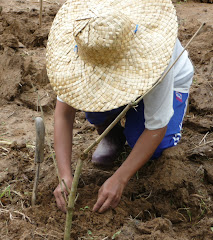SPPI believes that strong community organizations are the collective capacity of the people who create their own development goals and guarantee the sustainability of the project.
Table 1 – Organizational Data
| MUNICIPALITY (Number of Barangays/Federation) | Total House holds | Households Covered | Total PoP | PoP covered | Percentage of PoP coverage |
| CAPUL (5 +1) | 988 | 351 | 851 | 204 | 24% |
| | 1468 | 392 | 945 | 340 | 36% |
| MONDRAGON (5) | 1286 | 186 | 685 | 186 | 27% |
| SAN ROQUE (3) | 603 | 144 | 448 | 92 | 21% |
| DARAM (14+1) | 1262 | 334 | 1151 | 236 | 21% |
| SALCEDO (6 +2) | 459 | 222 | 230 | 187 | 81% |
| MERCEDES (12 +3) | 923 | 294 | 708 | 257 | 36% |
| GUIUAN (7+1) | 726 | 461 | 606 | 390 | 64% |
| (60/8) TOTAL | 7715 | 2384 | 4624 | 1892 | 41% |
Table 1 shows the organizing data in all municipalities covered by the LED program. The figures in parenthesis show the number of barangays and municipal federation in the area.
There are currently two (2) municipal sectoral livelihood associations in Northern Samar; the Mud Crab Producers Association of Rosario (MCPAR) and the Seaweeds Farmers’ Association of Capul (SFAC). There is one (1) sectoral livelihood association in
Upscaling the livelihood associations has resulted to four (4) municipal or inter-barangay federations of livelihood associations, two (2) inter-municipal federations (headed by councils); one (1) each in Eastern and Northern Samar.
There are two (2) province-based sustainable agriculture farmers associations, one (1) in Eastern Samar and the other, in Northern Samar; one (1) municipal-based association in Daram,
There is one (1) municipal women’s association in
4.1.2 There is a relatively broad participation in the leadership bodies of the livelihood associations.
Table 2 – Officers and Committees
| Program Areas | Total Membership | Officers & Committee Members | ||
| Total | Male | Female | ||
| 1. | 1716 | 246 | 53 | 193 |
| 2. | 1034 | 279 | 60 | 219 |
| 3. | 752 | 119 | 81 | 38 |
| LEDP Total | 3502 | 644 | 194 | 450 |
| 100% | 30.12% | 69.88% | ||
4.1.3 Periodic trainings were (and still are) conducted which deals with:
· Resolving problems faced by the respective organizations;
· Cultivating the right attitudes and values among leaders and members related to the resolution of said problems; and
· Developing skills in facilitating meetings and decision-making within the organization.
4.1.4 Local (community) part-time volunteers were enlisted in area clusters, from among the leaders, to take on some tasks in assisting the livelihood associations.
Table 3 – Local Volunteers
| MUNICIPALITY | MALE | FEMALE | TOTAL |
| Capul | 5 | 5 | 10 |
| | 3 | 5 | 8 |
| Mondragon | 0 | 6 | 6 |
| San Roque | 0 | 0 | 0 |
| Daram | 4 | 5 | 9 |
| Salcedo | 1 | 9 | 10 |
| Meredes | 1 | 8 | 9 |
| Guiuan | 1 | 7 | 8 |
| Total | 15 | 45 | 60 |
Table 3 shows gender segregated data for local volunteers.
Local volunteers’ mobilization also serves as training for leaders to take on tasks in community development work; in providing assistance to the associations at the barangay level. They perform financial audit of LCP operations (formed into area cluster audit teams) and assists
4.1.5 Focus for the period was on strengthening the associations, and resolving problems such as failures in leadership of the associations and problems in LCP management.
Table 4 - Capability Building Activities Conducted
The following are the capability building activities conducted by the organization which aimed at sustaining the implementation of the program:
| | Purpose/s |
| Organizational Meetings (Regular and Special) | Served as venues for the organization to discuss problems, issues and concerns. The parliamentary procedure is practiced during meetings. |
| Annual General Assembly | Discussion sessions for annual accomplishment reports and financial statements as well as other concerns like past dues, overdues, issuance of promissory notes, and barangay mediations. |
| Leadership Training | Empowered the officers and members of their roles and obligations in the organization and in the community. |
| Gender Sensitivity Orientation | Enhanced appreciation of gender issues and development concerns. |
| Gender and Development Planning | Provided skills and raise knowledge on gender planning. |
| Savings Mobilization Orientation | Provided knowledge on proper recording and budgeting. |
| Barangay Development Planning thru Participatory Resource Appraisal (BDP-PRA) | Reinforced community processes that involve community people from decision-making, planning, implementation, monitoring and evaluation. |
| Financial Literacy Training | Imparted skills on finance management to members of the livelihood associations. |
| Massage Therapy Training | Provided acupressure skills which can be an alternative source of income. |
| LEDP Conference | Shared best practices of the people’s organization covered by the program in the Samar island. |
| Social | Assisted the community organizations in determining the feasibility of their planned social enterprises. |
| Agrarian Reform Orientation | Provided answers to people’s questions on land ownership. |
| Contour Farming (on-farm Coaching) | Advocated for sustainable agriculture practices. |









